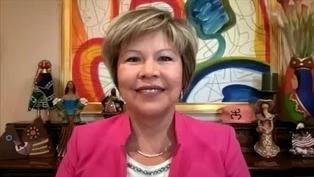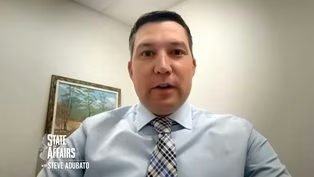State of Affairs with Steve Adubato
The Challenge of Breaking Into the Cannabis Industry in NJ
Clip: Season 7 Episode 16 | 9m 33sVideo has Closed Captions
The Challenge of Breaking Into the Cannabis Industry in NJ
Brenda Hopper, Founder and Owner of CannaBoy TreeHouse, and Former CEO/State Director of New Jersey Small Business Development Centers, joins Steve Adubato to share the challenges of a small business owner breaking into the cannabis industry in New Jersey.
Problems playing video? | Closed Captioning Feedback
Problems playing video? | Closed Captioning Feedback
State of Affairs with Steve Adubato is a local public television program presented by NJ PBS
State of Affairs with Steve Adubato
The Challenge of Breaking Into the Cannabis Industry in NJ
Clip: Season 7 Episode 16 | 9m 33sVideo has Closed Captions
Brenda Hopper, Founder and Owner of CannaBoy TreeHouse, and Former CEO/State Director of New Jersey Small Business Development Centers, joins Steve Adubato to share the challenges of a small business owner breaking into the cannabis industry in New Jersey.
Problems playing video? | Closed Captioning Feedback
How to Watch State of Affairs with Steve Adubato
State of Affairs with Steve Adubato is available to stream on pbs.org and the free PBS App, available on iPhone, Apple TV, Android TV, Android smartphones, Amazon Fire TV, Amazon Fire Tablet, Roku, Samsung Smart TV, and Vizio.
Providing Support for PBS.org
Learn Moreabout PBS online sponsorship[INSPRATIONAL MUSIC STING] - We're now joined by Brenda Hopper, who is the founder and owner of CannaBoy TreeHouse, and the former state director of New Jersey Small Business Development Centers.
Brenda, it's been too long.
Good to see you.
- Yes, it's good to see you.
- So you have gotten into the marijuana business.
- I know, I know.
But that was my son that said, "Ma, you gotta do this."
So I did it.
(giggles) - Okay.
First of all, what was his rationale as to why you should do this?
- Well, first of all, he's in criminal justice, and he said, "Ma, this new industry is going to blow up.
You're retiring from the state directorship, let's see if we can do something with the cannabis business."
Now, mind you, we have a CBD store in Union in 2019.
So it was a natural progression.
- Question, you said 2019 with the CBD store, right?
- Mm-hmm.
- COVID's impact on the cannabis industry from your perspective?
- I think that people are in tune to cannabis now more than ever.
What I've noticed since it was approved by the governor and New Jersey, that suddenly our CBD business wasn't as popular.
People came in for the real thing, which prompted us to apply for a retail license.
- How challenging to get that license?
- Oh, God.
- Really?
- It continues to be.
- And this is for someone who knows the system.
So go ahead, Brenda.
- Yes, absolutely.
And it is horrendous.
I mean, you have to deal with the New Jersey CRC, which is fine.
And they take their time.
- Is that the cannabis regulatory folks?
- That's correct.
The cannabis regulatory folks.
So you apply and you wait and wait and finally you get approval for a conditional license.
So we have a conditional license.
However, you have to have the municipality approve you, and that's another long process with the planning board, with traffic studies, with make sure the children don't think this is a tree house versus a cannabis shop.
I mean, we had three or four board meetings with the township of South Orange, and we're still waiting on the final approval for a permit.
- Are feds involved as well?
Is the federal government involved as well?
- No, no, this is strictly the municipalities and the Cannabis Regulatory Commission.
- So, Brenda, it's challenging for anyone to get into this industry, but is it even more challenging for people of color, specifically women of color?
- Absolutely.
Absolutely.
First of all, the CRC says, okay, they wanna give minorities and women a shot at this.
What they don't tell you is how expensive it is.
- How expensive we talking?
- Oh no, very expensive.
I took a shot at it and used my pension to actually get into this business.
When I tried to get a location on Route 22 West, either the landlord did not want cannabis or the rents tripled then what they were.
So I had to end up buying a building.
I bought a commercial property in South Orange, and I tapped my pension to buy a building.
And now we're paying for planning board meetings, we're paying for architectural drawings, we're paying for lawyers, we're paying for, it's just crazy.
It is so expensive.
- If you knew then what you know now.
(Brenda chuckles) Yeah, seriously Brenda, would you have done it?
- I have to think about that, because I had a very nice pension and I could have just retired and traveled all over the world.
But no, after six months of retiring and COVID, I was getting very antsy.
So it was, okay, let's do this.
And I'm all in it now at this point and waiting to open.
And hopefully we can compete with the franchises that are coming into the state so that we have a real shot at this.
- Whoa, whoa, whoa, hold on.
Franchise, what are we talking here?
- The major franchises from other states that come into New Jersey, and they have the deep pockets, they know the system, they know how to set up everything.
So we are also competing with that group.
So I'm- - So you're saying, again, a small business issue, which is obviously this is what you did for years.
- Yes.
- As the leader, as the state director of New Jersey Small Business Development Centers.
You understand this better than most, but you're saying that there are different kinds of cannabis operators and owners, and small business cannabis operators and owners are challenged in many of the same ways small business owners, regardless of your business.
Plus, it's more challenging because it's a new industry, right?
- Absolutely.
That's it.
You hit the nail on the head.
It is so challenging.
And like I said, you have to have deep pockets, and you have to have the fortitude to really continue with this business.
And I- - Is it a family business?
I'm sorry for interrupting, but this a family business?
- Yes.
My son.
- Who's in it?
- Linsey, my son Linsey Lofton and my two granddaughters, Tatiana Lofton and Sasha Lofton.
So it's a family business, small family owned business.
- What's that like?
(Brenda chuckles) - Well, they do all the work.
I do all the political things and writing for grants and trying to get funding for this business because I'm good at that part.
Linsey and Tatiana know CBD, they know cannabis, so they are really experts at it.
- Brenda, who's the market?
Who's the market?
What is the market?
- Well, initially we thought it was just the medical marijuana, but you had this underground of people that smoked weed, they smoked and they would buy it on the corners or they would buy it underground.
So now that market is now coming up to buying it legally and not getting in trouble for having it.
We still have people coming to our Union store asking, "Can we get cannabis yet?
Can we get cannabis yet?"
And that's when I said, "We're still opening up in South Orange."
So, yeah, there is a market for it.
- Real quick on this, are there, 'cause there are edibles.
I'm not as informed as I should be here.
There are edibles and then there are different forms, right?
- There's, yeah, all kinds of product.
Edibles, you have tinctures, you have capsules, you have the flower itself.
It's makeup.
They even have cannabis in makeup product.
We sell CBD products to pets to calm the anxiety, to all kinds of things.
So there's a huge market, and we certainly hope that we're successful in it.
- Well, Brenda, we wish you and your family all the best, and many, many times you've joined us in the past talking about other people's.
- Yes, yes.
- This is your business with your family.
This is Brenda Hopper, who's the founder and owner of CannaBoy TreeHouse and the former state director of New Jersey Small Business Development Centers.
Brenda, thank you so much.
We appreciate it.
- As always, thank you, Steve.
And you do look good.
- Thank you, Brenda.
We'll see you next time.
(chuckling) - [Narrator] State of Affairs with Steve Adubato Is a production of the Caucus Educational Corporation.
Funding has been provided by The New Jersey Economic Development Authority.
Hackensack Meridian Health.
Community FoodBank of New Jersey.
Valley Bank.
Robert Wood Johnson Foundation.
Choose New Jersey.
PSC.
Veolia, And by IBEW Local 102.
Promotional support provided by The New Jersey Business & Industry Association.
And by Northjersey.com and Local IQ.
- (Narrator) Life is full of changes.
At Hackensack Meridian Medical Group, we're ready for them.
If you have a cold or chronic illness, our five star doctors can treat any ailment.
Whether you're starting recess or retiring, we're prepared with pediatric and adult specialists.
And if you just moved here, we are in your neighborhood.
You now have access to a health team thousand strong.
So no matter what or when, we're ready.
Recruiting and Retaining More Latina Women in Politics
Video has Closed Captions
Clip: S7 Ep16 | 9m 55s | Recruiting and Retaining More Latina Women in Politics (9m 55s)
Rowan University Opens the State's First Veterinary School
Video has Closed Captions
Clip: S7 Ep16 | 8m 9s | Rowan University Opens the State's First Veterinary School (8m 9s)
Providing Support for PBS.org
Learn Moreabout PBS online sponsorship
- News and Public Affairs

Top journalists deliver compelling original analysis of the hour's headlines.

- News and Public Affairs

FRONTLINE is investigative journalism that questions, explains and changes our world.












Support for PBS provided by:
State of Affairs with Steve Adubato is a local public television program presented by NJ PBS

